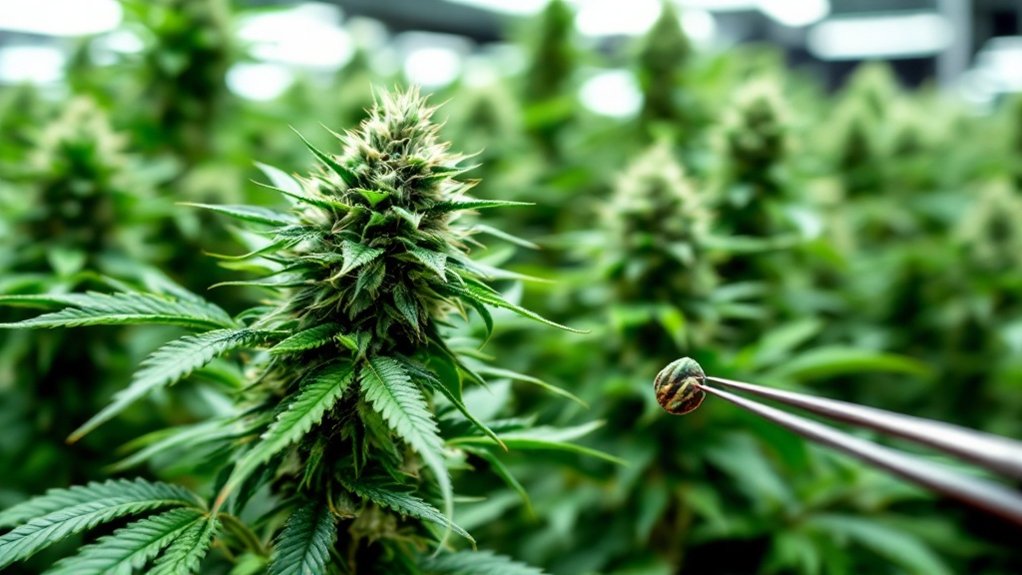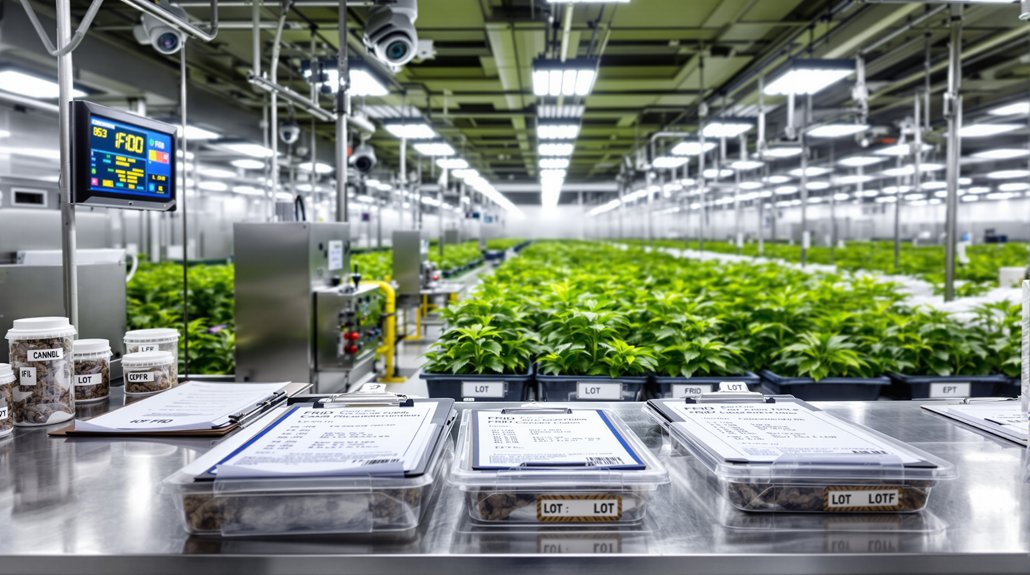Cannabis businesses face unique regulatory challenges that make employee onboarding particularly complex, requiring specialized compliance protocols and documentation procedures that traditional industries rarely encounter. The cannabis sector’s strict licensing requirements, state-specific regulations, and evolving legal landscape demand a comprehensive framework that addresses both federal employment standards and cannabis-specific operational mandates. This thorough approach guarantees new hires understand their role within highly regulated environments while maintaining organizational compliance. However, most cannabis companies struggle with one critical oversight that undermines their entire onboarding process.
Compliance & Documentation Requirements

When cannabis businesses establish their onboarding procedures, compliance and documentation requirements form the foundation of legally sound employment practices. Companies must verify eligibility to work in the United States using Form I-9 and E-Verify systems, while confirming state and local legal requirements including age restrictions, background checks, and mandatory cannabis certifications.
Employee classification as W-2 or 1099 requires accuracy per federal and state law, with regular audits preventing costly misclassification issues. Businesses operating in multiple states should implement compliance specialists to navigate the varying regulatory frameworks across different jurisdictions.
Documentation collection involves gathering compliance-related materials such as criminal record checks, state tax forms, direct deposit information, certifications, and signed agreements. Implementing applicant tracking systems helps filter candidates who meet established legal criteria before the hiring process begins.
Cannabis businesses must maintain detailed payroll and personnel records for three to seven years, following local retention laws. Digital self-serve onboarding software provides secure storage and organized access for regulatory audits. With only 12% of employees agreeing their organization has a good onboarding process, establishing clear compliance documentation procedures becomes even more critical for cannabis businesses seeking operational excellence.
Workspace & Technology Setup
Several critical components must align when cannabis businesses design their workspace and technology infrastructure to support both operational efficiency and regulatory compliance.
Point-of-sale systems require integration with seed-to-sale tracking platforms, enabling thorough inventory monitoring from cultivation through retail transactions. Secure network infrastructure becomes essential, incorporating business-grade firewalls and encrypted wireless connections to protect sensitive operational data.
Workstations must accommodate the repetitive tasks common in cultivation and processing environments, while adequate lighting supports visual accuracy during detailed work. Employers should implement ergonomic solutions to minimize the physical hazards associated with repetitive motions during trimming and processing activities. Cannabis cultivation and manufacturing facilities with heating or onsite consumption must implement an odor control plan developed by professional engineers or industrial hygienists to meet regulatory requirements.
Staff areas, including locker rooms and break spaces, require sizing based on employee counts to maintain hygiene standards and workplace satisfaction. Criminal background checks must be completed for all cannabis employees as mandated by state requirements to ensure regulatory compliance during the hiring process.
Technology provisioning extends to barcode scanners, mobile devices, and business computers that facilitate daily operations.
Data redundancy solutions, both onsite and cloud-based, guarantee business continuity while supporting the thorough documentation requirements inherent in regulated cannabis operations.
Training & Compliance Programs

Cannabis businesses must establish thorough training and compliance programs that prepare new employees to navigate the complex regulatory landscape governing the industry. These programs require mandatory participation in state-specific cannabis compliance courses covering federal regulations, risk mitigation, quality assurance, and employee safety protocols.
Cannabis businesses must implement comprehensive training programs to ensure new employees successfully navigate the industry’s complex regulatory requirements and compliance obligations.
Online modules typically require five to six hours for foundational training, featuring self-paced completion and documented assessments to verify proficiency.
Training encompasses evolving state and federal cannabis laws, track-and-trace systems like Metrc for inventory management, and local jurisdictional requirements. Employees learn risk management frameworks addressing money laundering prevention, waste minimization, and security best practices.
Product safety instruction includes proper labeling, packaging protocols, Good Manufacturing Practices, and contaminant testing procedures. Programs incorporate engaging multimedia elements like videos and interactive quizzes to enhance knowledge retention and ensure effective learning outcomes. Implementing seed to sale software is critical for ensuring regulatory compliance and streamlining inventory tracking throughout the business. Upon successful program completion, employees might receive a certificate of completion or digital badge to document their compliance training credentials. Ongoing education through webinars and refresher modules guarantees compliance with new legislation and industry standards.
Culture & Team Integration
Beyond regulatory compliance and technical training, successful cannabis businesses recognize that integrating new employees into the company culture represents a critical component of the onboarding process. Companies establish this foundation by introducing their mission, vision, and core values on Day 1, while outlining industry-specific workplace expectations that differ from traditional sectors.
Mentorship programs pair newcomers with experienced team members, accelerating integration through structured guidance and relationship building.
Leadership accessibility remains paramount, with open-door policies and early meetings between new hires and executives creating rapport across organizational levels.
Employee recognition programs acknowledge early contributions, fostering appreciation and engagement. Regular team-building initiatives within the first 90 days strengthen workplace relationships, while diversity and inclusion training guarantees all employees understand behavioral standards and the company’s commitment to social equity within the cannabis industry. Cross-training opportunities help employees develop transferable skills that enhance their career progression and workplace flexibility. Performance metrics help measure the effectiveness of these cultural integration efforts and provide insights into employee engagement levels. Given the cannabis industry’s turnover rate of 40 to 60% in the first two months, these cultural integration efforts become even more critical for long-term retention success.
Performance & Feedback Structure

Effective performance management systems serve as the backbone of successful employee development within cannabis operations, establishing clear expectations while providing structured pathways for growth and improvement.
Cannabis retailers benefit from tracking individual employee sales numbers, add-on consultations, and repeat customer requests to identify performance patterns. POS systems automate these measurements, streamlining the evaluation process while maintaining accuracy.
Standardized evaluation instruments with clear performance scales guarantee consistency across all assessments. Regular feedback sessions within the first 90 days create opportunities for course correction, while two-way communication channels gather insights from both management and staff.
When performance gaps emerge, targeted training interventions address specific deficiencies. Performance-based incentives motivate excellence, while structured improvement plans provide measurable goals for underperforming employees, creating accountability throughout the onboarding period. Historical performance records should be reviewed regularly during onboarding to identify employee development trends and optimize training approaches. Staff should be trained on fastest-growing categories like pre-rolls to maximize sales opportunities and customer satisfaction. Employee performance metrics directly impact key dispensary KPIs including customer satisfaction score and average transaction value, making effective onboarding essential for overall business success.
Benefits & Asset Allocation
While traditional industries have long established extensive benefit structures, cannabis businesses face unique challenges in creating competitive packages that attract top talent while managing the complexities of an evolving regulatory landscape.
Health benefits appear in 88% of cannabis employers‘ offerings, with dental and vision coverage standard for retention. Mental health services prove critical for high-stress operational roles, while fertility coverage reaches 70% of packages, exceeding traditional sectors.
Cannabis companies are setting new standards with fertility benefits in 70% of packages, surpassing traditional industries in comprehensive healthcare coverage.
Paid time off typically spans 2-3 weeks, though 30% offer flexible arrangements. Retirement plans remain rare industry-wide, despite their loyalty-building potential. Strong benefits packages help cannabis businesses overcome hiring barriers by demonstrating stability and professionalism to qualified candidates who may otherwise be deterred by regulatory uncertainty.
Salary ranges vary greatly: budtenders earn $17.20-$26 hourly, managers $60K-$120K, and executives $150K-$300K. Over 54% of budtenders received raises or promotions within their first year, demonstrating the industry’s commitment to rewarding performance and career advancement.
Industry-specific perks include product education programs, legal consultation services, and equity options for senior positions, directly improving retention rates.








